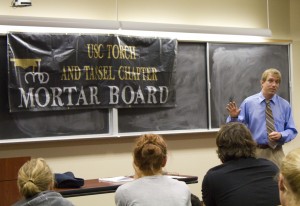Encouraging the next generation of great thinkers at USC
Whether it’s about learning as much possible as or having something substantial to put on a résumé, research is on the minds of many undergraduate students.
Research opportunities are traditionally easy to find in the natural sciences and engineering, as research is an obvious step for students pursuing these fields.
But lately there has been a push for more undergraduate research in other areas — particularly within the Dornsife College of Letters, Arts & Sciences.
“We’re trying to increase the number of people doing research in the humanities. It seems to be a lot easier for the kids in the social sciences and sciences,” said Steven Lamy, vice dean for Academic Programs for the Dornsife College.
Gene Bickers, vice provost for undergraduate programs, said for students in science and engineering, research “is a critical part of their preparation.” But
undergraduate research can enhance the college experience of any student.
“Whether you’re in the humanities or the sciences, working with an expert is one of the best ways to learn,” Bickers said.
‘It stimulates my brain’
Jenna Katherine Ross, a junior majoring in history, is currently assisting professor Peter Mancall on his upcoming volume about colonial North America. Ross explained her role involves reading through anthropological articles and investigating Inuit folklore to try to capture the Inuit identity.
“The best aspect of conducting the research is the way it stimulates my brain,” she said. “The professors rely on me to not only find, but interpret information, and they use what I collect in their professional work. Accordingly, I think really hard about everything that I’m doing, and I’ve found that I’ve learned so much — my ability to analyze historical information has increased, and I’m beginning to feel more like a real historian, and less like a
student.”
Finding the funds
The university has taken steps recently in the hopes that more undergrads will learn what it’s like to be a real researcher.
“The College has always had some funding for undergraduate research, but not an established program with dedicated funds,” said Lamy, who became vice dean for Academic Programs in 2008. “So, when Dean Gilman became the dean of the College and I became the vice dean for Academic Programs, we decided that was going to be one of our priorities.”
The Student Opportunities for Academic Research and Summer Undergraduate Research Fund both provide research stipends — $1,000 for SOAR and $3,000 for SURF — for undergraduate research. When the programs were launched, Dornsife College gave away $50,000 in research funding. Now, the programs sponsor more than $100,000 worth of undergraduate research in a year.
“Over four years we’ve given away $648,000,” Lamy said. “I don’t think there’s any other institution in the United States that can say that.”
The College isn’t just providing funding for research — it is also providing structured programs for students who might be unsure of where to
begin.
The Problems Without Passports program gives undergraduate students the opportunity to do problem-based inquiry research in foreign countries. The program is limited to undergraduate students — partly so they won’t be intimidated by competing for spots with more research-savvy graduate students — and can be paid for with SURF funding.
“We wanted to create a vehicle for undergraduate students to get involved right away,” Lamy said.
In past years, students have done everything from interviewing survivors of the killing fields in Cambodia to studying healing in Brazil. This year, undergraduates will have the opportunity to research global health in Oxford, England, the effect of climate and environmental change on the ancient Mayan civilization in Belize, and possibly the politics of indigenous language in Ireland.
‘We expect the numbers to grow’
SOAR and SURF have increased funding opportunities for undergraduate research, but there are a number of other possibilities.
Several departments, such as international relations, have their own funds to distribute for undergraduate research. Individual schools often have their own funds, too.
There are also several university-wide funding sources.
Last summer more than 70 students conducted research funded by the Rose Hills Foundation, which grants fellowships of $5,000 each, according to Bickers. More than 50 students received $3,000 stipends from the Provost’s Research Fellowship last summer, and an additional 100 students received $1,000 fellowships in the fall. An additional 150 students received funding from the Undergraduate Research Associates Program.
“We expect the numbers to grow this coming year,” Bickers said.
Typically, about 70 percent of research proposals are accepted, Bickers said; proposals are generally rejected because they lack detail.
Still, the university is hoping to increase the percentage of proposals it can approve, and new sources of funding are always being sought.
Inquiring minds
Though these programs and fellowships have helped increase the number of undergraduates involved in research, Lamy said the College is still looking for ways to engage students in humanities research specifically.
Finding a research project can be more difficult for students in the humanities, but Bickers encourages students to be curious and seek out opportunities.
“One of the best ways to learn about humanities research is to visit with a faculty member during office hours and inquire — often,” he said.
Andrew Jones, a senior majoring in history who is also assisting Mancall with his book, said being proactive is critical.
“My perception is that there’s a grant out there for anyone who has the imagination and dedication to come up with a project,” Jones said. “In the history department, I’ve been lucky to have professors eager to introduce students to research opportunities. But ultimately students must take initiative, which is how it should be.”

